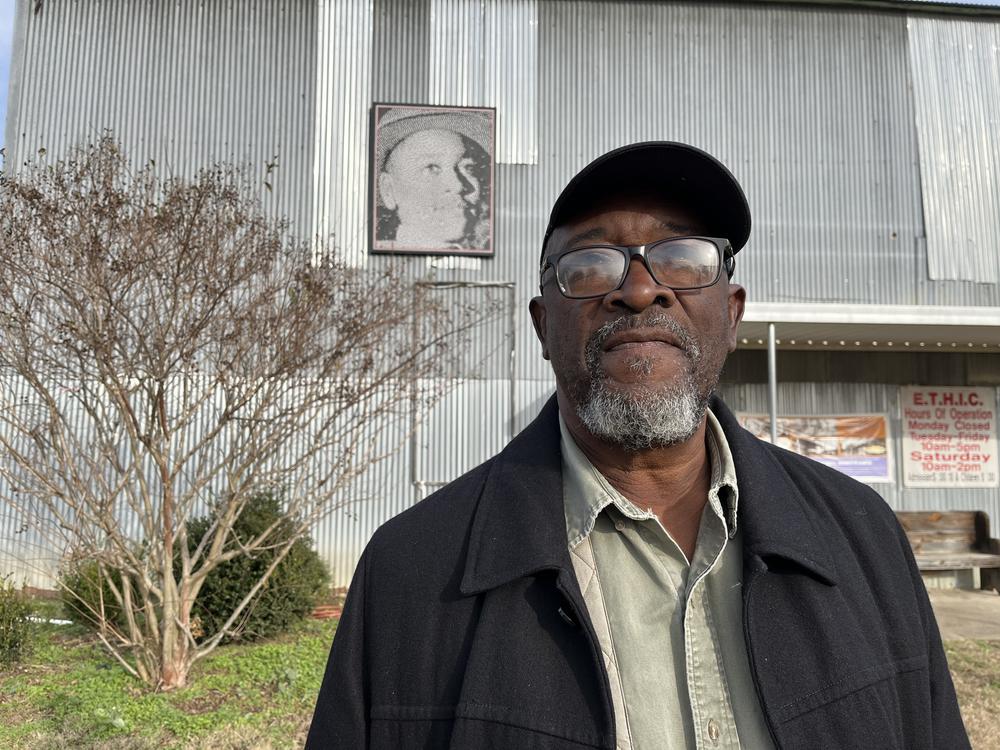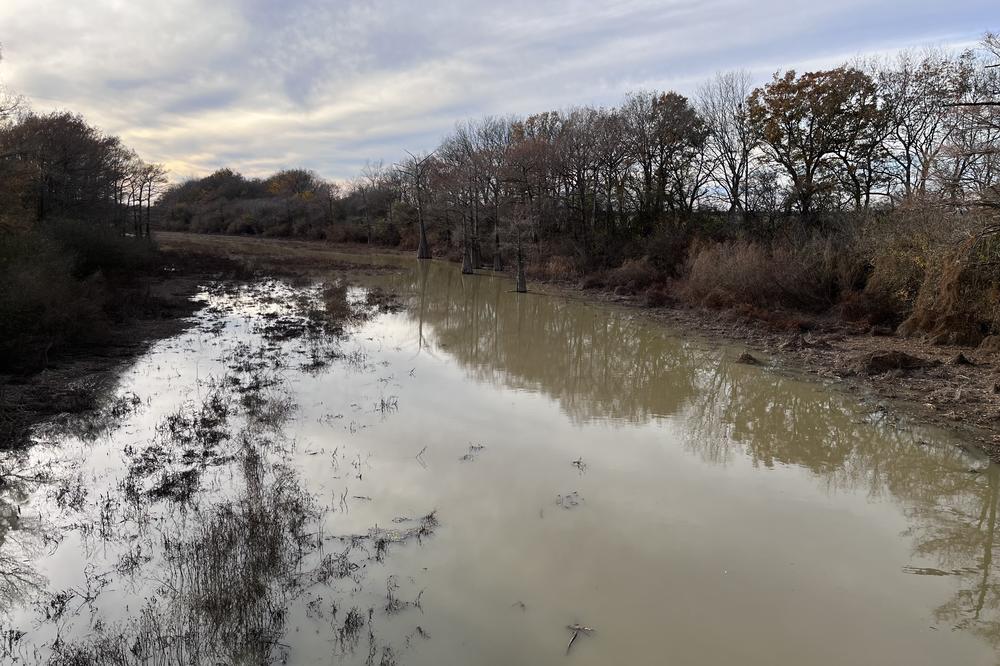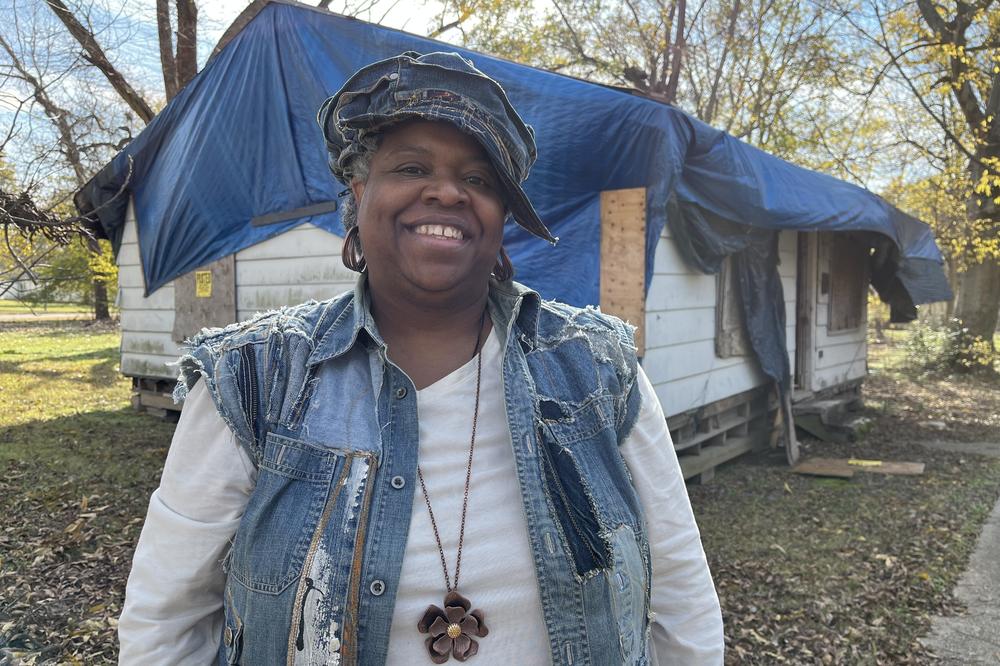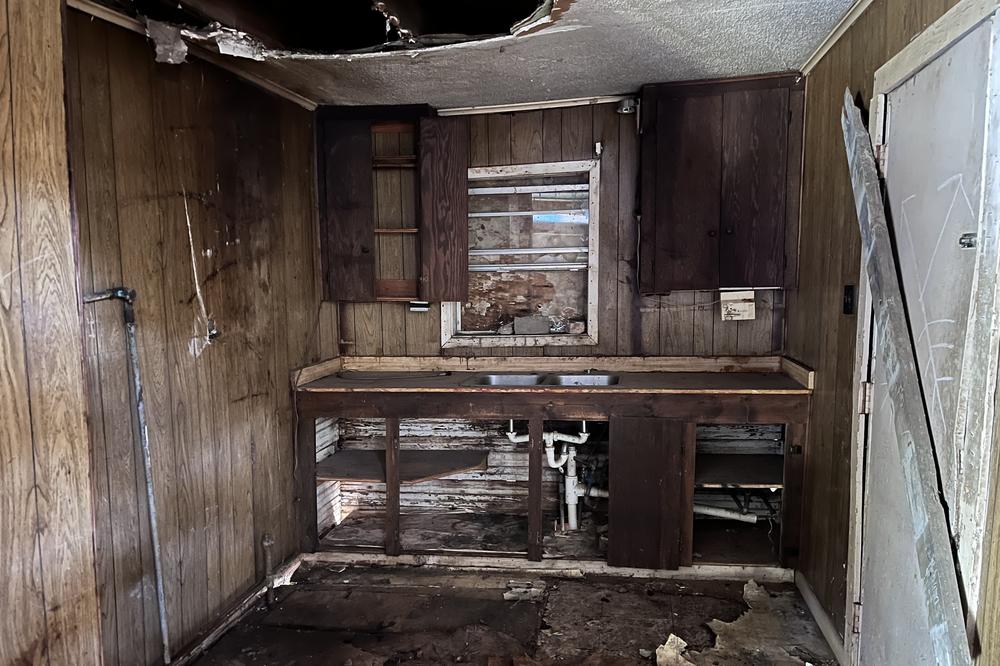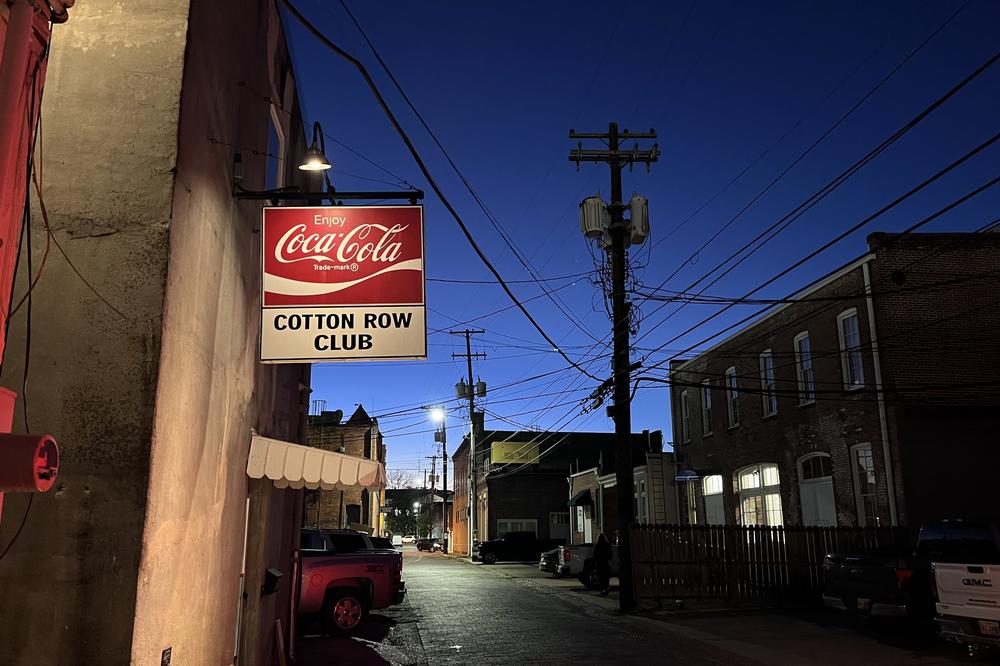Section Branding
Header Content
Landmarks fall, memories fade. Civil rights tourism may protect Mississippi history
Primary Content
GLENDORA, Miss — On a remote country highway running along the railroad tracks in Money, Miss., a historical marker stands on a corner where nature has overrun a building.
It's what's left of Bryant's Grocery, the store where Emmett Till, a 14-year old Black teenager visiting from Chicago, allegedly flirted with the white female shopkeeper in 1955, a violation of the Jim Crow segregation code.
Days later, his disfigured body — beaten, shot, and bloated — was pulled from the Tallahatchie River. The brutal killing sparked the modern civil rights movement.
But this key building in the Emmett Till story is crumbling.
It's in the heart of the Mississippi Delta in the northwest part of the state – where cotton and soybean farms stretch as far as the eye can see. The region is a wide, flat plain from Memphis, Tenn., to Vicksburg, Miss., along the Mississippi River, and it has big claims to America's Civil Rights history.
Preservationists say now is the time to protect these endangered landmarks, and get firsthand accounts of the history before memories fade and structures collapse. They're hopeful new federal investment in the region can help make civil rights tourism an economic driver in the Delta and contribute to lifting communities out of deep-seated poverty.
"Well, the significance for this community would be transforming," says Johnny Thomas, the longtime mayor of the tiny all-Black town of Glendora, Miss.
He's the founder of a museum here called the Emmett Till Historic Intrepid Center. It's inside an old cotton gin on property that was once owned by one of Emmett Till's murderers.
"Right here in the barn there he was beaten," Thomas explains. "And then taken on what we call the trail of terror."
That trail, he says, ended on a nearby bridge, now abandoned and overgrown with grass. Thomas points to a spot where the bridge span is severed, recounting the local lore that this is where the killers dumped Emmett Till into the Black Bayou with the weight of an industrial cotton gin fan strapped to his body.
"We say here Emmett's body broke the bridge — the weight that broke the bridge."
Some of the historical sites are chilling but hard to find
This is one of several sites that gives pause as you reflect on the Emmett Till story. But the only thing that ties them together are roadside historical markers for the Mississippi Freedom Trail.
A major state-funded civil rights museum is in the capital city Jackson. But in little Delta towns, it's mostly been local groups trying to scrape together whatever they can by charging admission fees at volunteer-run museums or collecting donations to maintain important historical sites.
A recent study by the National Park Service noted a lack of tourism infrastructure in the Delta, calling for more investment and better context showing the significance of these places in American history. Indeed, many of the different sites are an hour or more's drive apart from one another, and some feel half-finished or neglected.
Thomas is counting on that to change, especially with new money coming into the region from the recent federal infrastructure law that he and others are hoping to tap And there's long been a push to create a federally-run Emmett Till National Historic District that would link key sites.
"We've been left behind," he says. "We're not benefiting as we should with this history."
The U.S. Census says 85% of people in Glendora live below the federal poverty line. Thomas, who is 69, says not much has changed since he was a kid. Across the Delta, the land and wealth remain largely in the hands of the minority white population.
Putting Black voices in charge of the narrative could help shift the dynamic, says Rolando Herts, the director of the Delta Center for Culture and Learning at Delta State University in Cleveland, Miss.
"That's part of the concern that we see now with civil rights heritage tourism now on the rise," Herts says. "It's African American civil rights. But who will be in control of that story? Who will be benefiting from the stories that are being told?"
Herts is working with local communities to highlight those stories and stitch them together as a network through the Mississippi Delta National Heritage Area — a National Park service program that has already brought millions in federal grants. He acknowledges it's a tall order.
"We're creating spaces for these communities to share their stories in a place where there was fear, there was shame around telling those stories," Herts says.
A historic freedom house is close to decay
Off a worn road in a neighborhood near downtown Indianola, Miss., a fragile clapboard house with a tarp over its roof stands below some sagging trees. Felicia King inherited the home from her family a few years back.
"My grandfather built this house," she says, stepping inside where the floorboards are rotting away. "My dad's dad — Estell 'Tye' King."
She always thought this was just a rental house. But later in life she learned that it was actually used as a freedom house, the local headquarters for SNCC — the Student Nonviolent Coordinating Committee during its Freedom Summer Campaign in the mid-1960s.
King says those were dangerous times in the Mississippi Delta trying to get Black people registered to vote, adding: "They killed people behind that."
The Mississippi Heritage Trust lists Freedom Houses like this one as among the most endangered places in the state because a lot of them did not survive the civil rights era.
"They were firebombed and burned to the ground," says Lolly Rash, executive director of the Trust. "They're not there anymore for us to use that building to tell this story."
Rash helped King get a federal grant to stabilize the Indianola house in hopes of one day using it as a community center.
"It's an important part of our cultural landscape," Rash says. "So let's save it and use it in this wonderful way that brings about community reconciliation."
She calls new federal resources directed to the Delta "a Godsend."
"There are opportunities out there now that weren't there several years ago."
King, meantime, has been pondering why, growing up, she never heard about the role her grandfather and this house played in the civil rights movement.
"And the answer is because it's painful," she says.
Not in the past tense, but still today.
"It's painful to talk about because there are people that are still living who walked that walk during that time," King says. "And it was traumatic."
She hopes the next generation can take inspiration from how what happened in Mississippi changed the course of American democracy.
"We matter; we are important; we have value here," King says. "Because what happened here has affected basically the whole world."
A retelling of history with an eye toward unity
You feel that sense of pride over in Mound Bayou, a nearby town founded by formerly enslaved people.
"You cannot tell African American history thoroughly without mentioning Mound Bayou," Darryl Johnson says.
He and his brother, Herman, have used a grant from the Mississippi Delta National Heritage Area to amass an eclectic collection of Americana in an old high school band room. It honors what their ancestors created from wilderness in 1887.
"Enslaved people had a vision," Herman says. "And in that vision, they came and they founded Mound Bayou – here in the most inhospitable state in the country."
During Jim Crow, the town thrived as a center for Black enterprise – with its own hospital, insurance companies, credit unions, and newspapers.
Like much of the Mississippi Delta, Mound Bayou is not really thriving today. Darryl says new investment in civil rights tourism in the region could be a boost locally, but more importantly, help heal a divided people.
"If we tell this story," he says. "We can help a whole nation and the whole world in understanding who the United States is."
Copyright 2023 NPR. To see more, visit https://www.npr.org.
